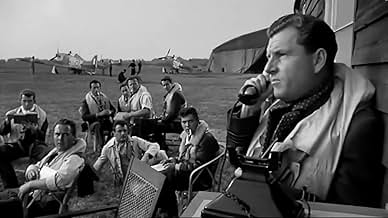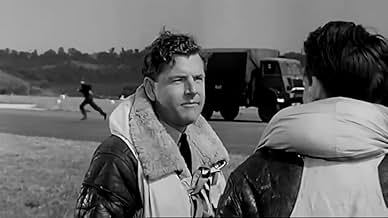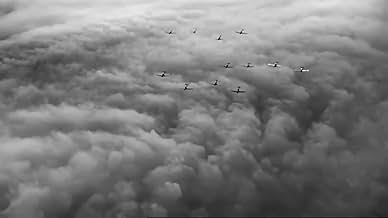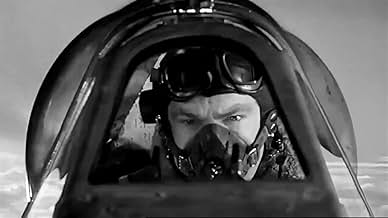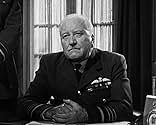IMDb रेटिंग
7.2/10
3.1 हज़ार
आपकी रेटिंग
अपनी भाषा में प्लॉट जोड़ेंBiopic of RAF Group Captain Douglas Bader who, after having lost both legs, flew a British fighter plane during WWII.Biopic of RAF Group Captain Douglas Bader who, after having lost both legs, flew a British fighter plane during WWII.Biopic of RAF Group Captain Douglas Bader who, after having lost both legs, flew a British fighter plane during WWII.
- निर्देशक
- लेखक
- स्टार
- 1 BAFTA अवार्ड जीते गए
- 1 जीत और कुल 4 नामांकन
Howard Marion-Crawford
- 'Woody' Woodhall
- (as Howard Marion Crawford)
फ़ीचर्ड समीक्षाएं
The facts of Douglas Bader's life were accurately portrayed in this excellent movie. It is a great movie to watch when you are feeling lousy, and life has got you down. Douglas Bader had an amazing spirit, and lived life to the fullest. Eventhough his lost both of his legs in a flying accident. That did not stop him from becoming a war hero. Who contributed a lot to destroy Nazism, and to preserve our free way of life. I salute Douglas Bader, and this excellent movie about his life.
'The channels are blocked? Then we'll ruddy well UNblock 'em!' This is the point in the film where I feel like cheering, as it perfectly sums up Bader's 'can do, will do' approach. It's the true story of Douglas Bader, a young flying enthusiast who went on to be a fearless WW2 Spitfire pilot, losing both legs in the process. His struggle to walk again, his courting of a pretty girl and his later formation of 'the big wing' in the fight against the Nazi invasion are laid out here with gusto, verve and a little humour. Kenneth More is excellent as Bader, using his natural, relaxed acting technique to give the part a free-wheeling energy. The very pretty Muriel Pavlow plays his wife who grows increasingly concerned at his derring-do, and there is a solid cast of British regulars of the time. The music is stirring, the direction brisk and the story itself is straight out of a Boys' Own comic. What more could you ask for? A perfect Sunday afternoon film.
The credits advise that some events and depictions of people/events have been altered for story telling purposes , so this film is not a strictly accurate history of Douglas Bader. Also played down somewhat is Baders arrogance and foolhardiness which lead to his disability in the first place. Still as a inspiration for disabled people and as an almost factual account of Baders life and as film entertainment , it's pretty good. Made reasonably close to the war years it is able to capture the feeling of those years quite well. It is a trifle 'stiff upper lip - what ?' but Kenneth More as usual turns in a good performance. Focusing mainly on Baders attempts, and resulting achievements in war time flying, after a crash means both lower legs have to be amputated. Quite gritty and not too sentimental this offering from director Lewis Gilbert stacks up well against similar films of the time.
Douglas Bader (1910-1982) was one of Britain's most popular heroes of WWII, a celebrated combat pilot and Flight Commander. His triumphs during the Battle of Britain proved significant in the Allied victory. In 1941, after he was taken prison in German-occupied France, Bader caused headaches for the enemy with repeated escape attempts, and he was eventually confined to Colditz Castle, a prisoner-of-war camp reserved for such trouble-cases. And did I mention that he did all these things without the use of his legs? On December 14, 1931, Douglas Bader had crashed his aeroplane while attempting low-altitude maneuvers, sustaining such injuries that doctors were forced to amputate both legs. The characteristically resilient pilot later understated the gravity of his disaster with this laconic note in his logbook: "Crashed slow-rolling near ground. Bad show." Following the success of Paul Brickhill's biography, British director Lewis Gilbert (most noted for later directing several James Bond films) brought Bader's story to life, an inspirational testament to a man for whom "impossible" was not a word.
The natural comparison for 'Reach for the Sky (1956)' is Wyler's 'The Best Years of Our Lives (1946),' which starred a real-life war veteran (Harold Russell) who had lost both arms in combat. There are biographical distinctions, of course – Bader lost his limbs in peace- time, and later fought while "disabled" – but the basic theme of overcoming one's handicaps through hope and determination holds firm. Kenneth More {whom I recently discovered in the gripping Titanic docu- drama 'A Night to Remember (1958)'} brings a likable cockiness and fierce determination to the leading role. Bader's dogged resolve at times seems terse and even stubborn; his notion of success appears to hinge upon rejecting the helping hands of friends and loved ones. In his attitudes, there is a certain conceitedness, perhaps a necessary attribute for a pilot who rose to the military rank of Group Captain. More's portrayal certainly imparts these elements of vanity, but one can't help but be inspired by a man whose never-say-die outlook knows no bounds.
Muriel Pavlow plays Bader's wife, Thelma, a delicate woman who seems unfairly neglected while her husband chases his ambitions. Though given substantially less screen-time, the film's most interesting female character, I thought, was Dorothy Alison's nurse, who tends Bader back to health following his accident. Her appearance is brief, but incredibly subtle: just watch the series of conflicting emotions flicker across her face as Bader departs, love and sadness and everything in between. I had expected the nurse to make an appearance later in the film, but she appears to have been shunned permanently from Bader's life. This ties in nicely with the leading character: after resolving himself to be entirely self-sufficient, he must reject the one woman on whom he once relied so heavily. In Wyler's film, Russell's character accepts that he'll never be entirely independent, and it's only fitting that he should marry a woman who'll always be there to offer a helping hand. Bader rejects this helping hand; he's not much of a husband, but he is one hell of a battler.
The natural comparison for 'Reach for the Sky (1956)' is Wyler's 'The Best Years of Our Lives (1946),' which starred a real-life war veteran (Harold Russell) who had lost both arms in combat. There are biographical distinctions, of course – Bader lost his limbs in peace- time, and later fought while "disabled" – but the basic theme of overcoming one's handicaps through hope and determination holds firm. Kenneth More {whom I recently discovered in the gripping Titanic docu- drama 'A Night to Remember (1958)'} brings a likable cockiness and fierce determination to the leading role. Bader's dogged resolve at times seems terse and even stubborn; his notion of success appears to hinge upon rejecting the helping hands of friends and loved ones. In his attitudes, there is a certain conceitedness, perhaps a necessary attribute for a pilot who rose to the military rank of Group Captain. More's portrayal certainly imparts these elements of vanity, but one can't help but be inspired by a man whose never-say-die outlook knows no bounds.
Muriel Pavlow plays Bader's wife, Thelma, a delicate woman who seems unfairly neglected while her husband chases his ambitions. Though given substantially less screen-time, the film's most interesting female character, I thought, was Dorothy Alison's nurse, who tends Bader back to health following his accident. Her appearance is brief, but incredibly subtle: just watch the series of conflicting emotions flicker across her face as Bader departs, love and sadness and everything in between. I had expected the nurse to make an appearance later in the film, but she appears to have been shunned permanently from Bader's life. This ties in nicely with the leading character: after resolving himself to be entirely self-sufficient, he must reject the one woman on whom he once relied so heavily. In Wyler's film, Russell's character accepts that he'll never be entirely independent, and it's only fitting that he should marry a woman who'll always be there to offer a helping hand. Bader rejects this helping hand; he's not much of a husband, but he is one hell of a battler.
It's always encouraging to see the indomitable human spirit gain control against all odds. How easy it would have been for pilot Douglas Bader, played by Kenneth More here, to simply give in to circumstances, drop out of active life, and lead a limited existence all because of a dreadful plane accident in which he lost both legs. But he didn't choose to go that way, and with the advent of WW2 he managed to resume his active pilot career despite the fact of having artificial legs, and had more than a few adventures which he survived. I like this movie for its positive grasp of life and living, and shows that you can create your world if you have singleminded determination. Also of interest were the real life film footage of aerial manoeuvrings used from the war. I'd recommend this war movie any time.
क्या आपको पता है
- ट्रिवियाRichard Burton was the first choice for the lead but he dropped out after he was offered the lead in Alexander the Great (1956) at what Lewis Gilbert describes as "three or four times the salary".
- गूफ़When Bader is demonstrating his ability to fly the Hurricane to his new squadron of Canadian pilots, there is a long cut of the plane flying upside-down in a straight line. This was impossible in the Hurricane, as it had a gravity-fed carburettor. If you look carefully at the clouds, and how the sunlight reflects from them, the image has clearly been inverted.
- इसके अलावा अन्य वर्जनOriginally released in Great Britain at 135 minutes; cut by 12 minutes before the American premiere.
- कनेक्शनFeatured in Century of Cinema: Cinema of Unease: A Personal Journey by Sam Neill (1995)
टॉप पसंद
रेटिंग देने के लिए साइन-इन करें और वैयक्तिकृत सुझावों के लिए वॉचलिस्ट करें
- How long is Reach for the Sky?Alexa द्वारा संचालित
विवरण
- रिलीज़ की तारीख़
- कंट्री ऑफ़ ओरिजिन
- भाषाएं
- इस रूप में भी जाना जाता है
- Čežnja za nebom
- फ़िल्माने की जगहें
- उत्पादन कंपनियां
- IMDbPro पर और कंपनी क्रेडिट देखें
बॉक्स ऑफ़िस
- बजट
- £3,80,000(अनुमानित)
- चलने की अवधि
- 2 घं 15 मि(135 min)
- रंग
- पक्ष अनुपात
- 1.85 : 1
इस पेज में योगदान दें
किसी बदलाव का सुझाव दें या अनुपलब्ध कॉन्टेंट जोड़ें


